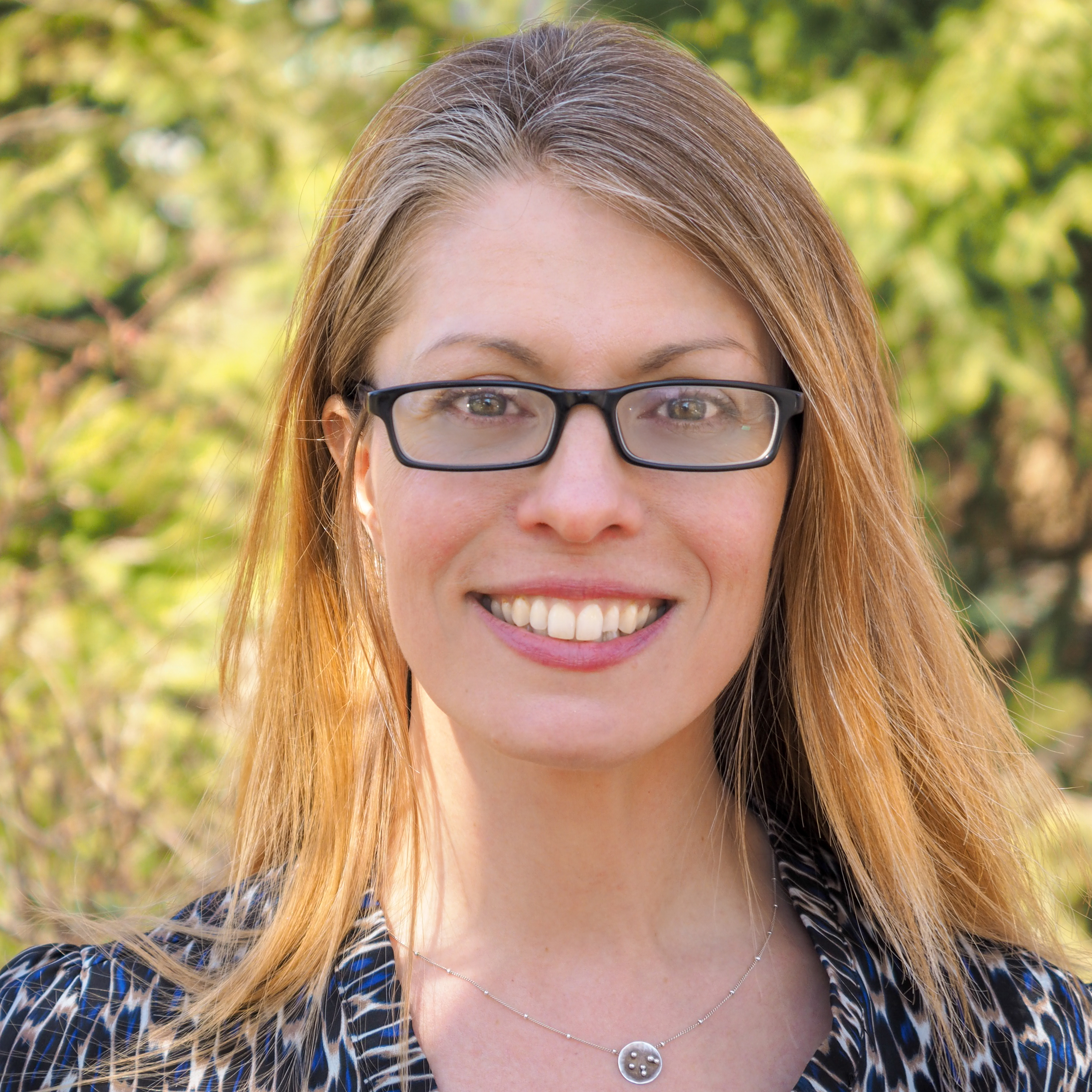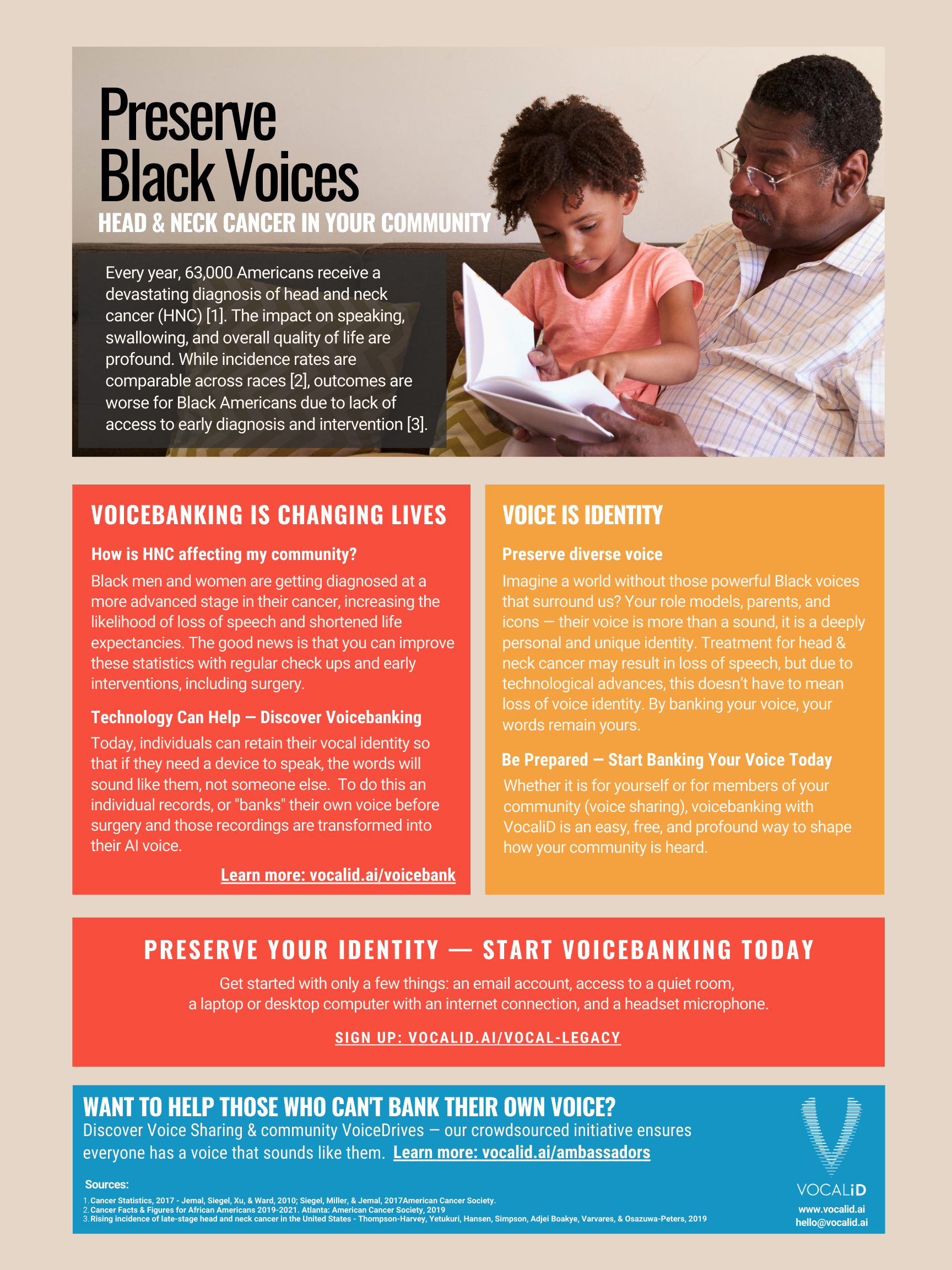VOICEBANKING & SPEECH LOSS IN BLACK AMERICANS WITH HEAD AND NECK CANCER
(DOWNLOAD)

MICHELE J MARTIN
Many of us will experience a cancer diagnosis, directly or indirectly, at some point in our lives. Whether it is ourselves, a family member, or someone in our community, cancer affects us all.
According to the American Cancer Society, an estimated 1,806,950 people in the US will be diagnosed with cancer in 2020. Of those, 63,000+ will be head and neck cancer (HNC). HNC's impact on speaking, swallowing, and overall quality of life are profound. The incident rate, or the number of new cases, of HNC across races, is similar. However, Black men and women are getting diagnosed at a more advanced stage in their cancer. This increases the likelihood that they will experience loss of speech and shortened life expectancies. Research suggests that the reasons for late-stage diagnosis are often due to a lack of access to early diagnosis and medical interventions.
The good news is that you can improve these statistics with regular check-ups and early interventions, including surgery.
Treatment for head & neck cancer may result in loss of speech — thanks to technological advances in voice preservation and voicebanking, this doesn't have to mean loss of voice identity.
Imagine a world without those powerful Black voices that surround us? Your role models, parents, and icons — their voice is more than a sound, it is a deeply personal and unique part of who they are. Vocal identity, or the uniqueness of our distinct voice, is deeply connected to the roots of who we are and where we come from. Voicebanking, also known as voice preservation, does more than just provide a person with the ability to speak in a familiar voice. It allows them to stay connected to where they come from.
Once someone has completed voicebanking, if needed, they will have the ability to purchase a preview and a Vocal Legacy voice from VocaliD. Our Vocal Legacy clients have told us that voicebanking was incredibly powerful for them and their loved ones.
Today, individuals can retain their vocal identity so that if they need a device to speak, the words spoken will sound like them, not someone else. It is the simple act of recording (or "banking") ones voice by reading aloud stories on VocaliD’s online studio. The recordings are then used to train the AI voice and the result is a Vocal Legacy voice. This acts as a voice prosthesis that can be used with the MyVocaliD mobile app or another assistive device.
Absolutely! Voicebanking with VocaliD is easy and free — and it is a profound way to shape how your community is heard. Whether you are at risk or not, consider voicebanking as a way to protect and preserve your voice for the future.
It really is simple. All you need is a computer, headset microphone, a quiet room, and a few hours. (If you don't have access to these things, reach out to your local community center, health clinic, or church — they may be able to provide Covid-safe access at their location so that you can preserve your voice with voicebanking.) At your own pace, you will record a total of around 2k sentences. You don't need to record it all in one session, in fact you shouldn't because you want your voice and energy to be strong all the way through your recordings. The better the recordings, the higher quality the AI voice will be!
We understand that you may need help navigating this process and we want you to know that we are just an email away: hello@vocalid.ai
You can also choose to participate in VocaliD's crowdsourced Human Voicebank Initiative. By sharing your voice, we can offer an individual living with speech loss an AI voice that they can identify with. These voices are made by carefully blending recordings from different voice sharing community members to create a new, unique voice for that individual.
We recognize that not everyone has the same access to the items needed to voicebank or voice share. (a quiet room to record, desktop or laptop computer with wifi access, and an over-the-ear headset with microphone) We don't believe that access should keep an individual from preserving their voice. You can help! Are you a neighborhood center, church, or organization that can help bring voice preservation to your community by providing public access to a quiet space and voicebanking equipment?
Make sure that your family, friends, and community members know the risks of head and neck cancer, the symptoms to look out for, and that they are getting regular check-ups. And while you are taking care of your community, don't forget to look after yourself. Make sure to schedule your check-ups too! Please click the social share buttons right below the flier and share it with your friends and followers on social media. You can also download it and print it out to share on local community boards.
For those with access to the needed equipment and a quiet space to record — voicebanking and voice sharing are safe at-home processes. If you are using a community space to do your recordings, for sanitary purposes, please consider purchasing an affordable gaming-type headset with an attached microphone for your personal use.

Spread the word
Facebook
Twitter
LinkedIn
Pinterest